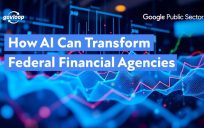This articles is an excerpt from GovLoop’s recent guide, “IT Modernization: How Government Does IT.” Download the full guide here.
When it comes to the future of data centers, government IT faces many challenges. First, technology is rapidly evolving while government data centers lag in their ability to deploy such technologies. Secondly, agencies must make tough decisions when balancing between the priorities of securing data while making it accessible to the right users. Lastly, IT leaders need to derive maximum value from their data through analytics to enable better decision making.
Instituting a future-ready data center is essential to ensure data is secured and integrated across the data center and into hybrid and multi-cloud environments. But to modernize the data center, agencies not only must navigate the data deluge and transfer of workloads, they must consider what is financially and logistically feasible.
Traditionally, IT teams worked in silos, tackling each part of their data center operations independently rather than opting for a single robust solution that balances resources and performance needs across an entire enterprise. Given the vigorous pace associated with managing data capacity, back-up, disaster recovery, data protection, storage, compute and networking needs, modernizing all these disparate components of data centers can be overwhelming.
That’s why the path forward involves an as- a-Service approach to streamline delivery of capabilities and technology while reducing costs. Specifically, Data Center as-a-Service (DCaaS) will help agencies modernize their data centers and operate more efficiently while supplying better services to citizens.
To learn more about DCaaS, GovLoop sat down with Rob Davies, Executive Vice President of Operations at ViON. ViON Corporation, is a Cloud Service Provider with over 37 years of experience designing and delivering enterprise data center solutions to government agencies and commercial businesses.
“Agencies have to respond to multiple competing goals, and are required to comply with FITARA legislation and the Modernizing Government Technology Act,” Davies said. “Agencies must have a very detailed, granular understanding of their data centers (for example, what databases are running which critical workloads and what other applications call on that data) to make good decisions regarding IT modernization.”
DCaaS can help agencies streamline their modernization efforts and meet these competing priorities through scalable, on-demand services. It can address many modernization challenges by providing all facets of data center technology, including hyperconverged infrastructure, data management, data protection and analytics, as-a-Service. By accelerating and streamlining delivery of capabilities and technology, DCaaS can immediately reduce costs and rapidly scale the data center assisting agencies that need to improve their FITARA scores and optimize their data centers.
“DCaaS is not about the individual components of the data center,” Davies said. “It’s operating a technology stack such as hyperconverged infrastructure (HCI) that’s very dense. It’s dense in storage capability and compute capability, which means agencies are consuming less power, maximizing floor space and virtualizing their data center platform.”
Through DCaaS, agencies can improve IT performance and efficiencies cost effectively; not just in procurement but also in terms of energy efficiencies, floor space and human capital. “As you improve the deployment of these technologies, you’re going to see a lot less downtime,” Davies added. “Once you virtualize workloads across platforms, you’re not dependent on one set of servers or storage.”
Data center modernization strategies can involve multiple stakeholders, adding complexity that requires serious innovation. This can be overwhelming for any agency with disparate legacy infrastructure and pressure to comply with legislation like FITARA. Applying as-a- Service models to data centers can help agencies secure and manage their data in a unified solution. Ultimately, DCaaS can help government future proof their data centers while delivering and securing mission critical-data.
“In the end, agencies have a mission to support and they need resources to operate,” Davies said. “With DCaaS they can effectively manage, monitor and deploy the resources needed to operate those data centers.”
“ViON has helped agencies optimize their data center with as-a-Service programs for over 17 years. We focus on strategic agency mission as top of mind, rather than primarily focusing on technology,” said Davies.
ViON leverages their professional services teams to help organizations make the right architectural choices and determine the level of support they need to future- proof their data center and, ultimately, plan their hybrid cloud solutions. ViON’s Data Center as-a-Service offers innovative hyperconverged solutions from OEMs such as NetApp with an as-a-Service offering including a full range of professional and managed services, allowing customers to focus on business outcomes while ViON delivers outstanding customer experience.






Wilson – your post struck a cord with me. I think sometimes people (myself included) can get so tied up in being the best that they miss awesome collaboration opportunities that could end up being very beneficial. Thanks for sharing!